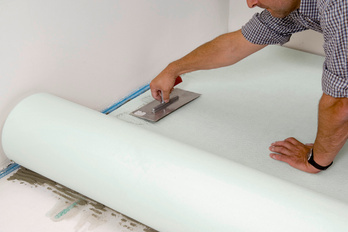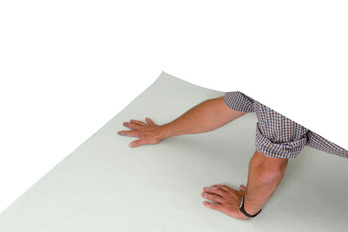For detailed information, other images and documents, please select individual articles from the following table.
Uncoupling membrane CERAfix® 205
For isolating stresses while laying tiles and natural stone or parquet, laminate flooring and carpets
Register now and access more than 60,000 products


Variants
Register now and access more than 60,000 products
Call customer service: +43 50 8242 0
Prices for customers after login
Easy to apply
- Easy to unroll and lay
- Can be laid with no folds
- Minimal lengthwise and crosswise expansion
Suitable for new buildings and renovations
Application using CERAfix tile adhesives. Use ZAB4 notched trowel
Dispose of CERAfix 205 as construction waste.


The above application instructions are recommendations given on the basis of our own tests and experience. We recommend that you carry out your own tests before use. Due to the great variety of different applications and storage and processing conditions, we cannot guarantee a particular application result. We will not accept legal liability for any advice or technical information provided by our free customer hotline unless this advisory service and/or technical information is part of the contractually agreed performance owed by us, or the customer service employee acted willfully or intentionally. We guarantee the consistent quality of our products and reserve the right to make technical changes and improvements.
For isolating stresses when laying tiles, natural stone, ready-to-use parquet, solid parquet and laminate. On even as well as on critical substrates or substrates with adhesive residues and highly adhering screeds, such as those that regularly occur in renovations. Using CERAfix 205, hairline cracks and shrinkage cracks in mineral substrates up to a width of 0.5 mm can be bridged. The decoupling non-woven fabric's high degree of resistance to tearing reduces stresses from the substrate and keeps them away from the subsequent top substrate.
CERAfix® 205 is a laying surface with uniform absorbency, which means that shear tensions caused by uneven adhesive hardening can be prevented.
For system decoupling on thin-layered underfloor systems with CERAfix 222.
The surface must be dry, suitable for adhesion and level. Old coverings must ensure sufficient adhesion to the surface, which is why old loose textile or elastic coverings must be glued in place. Loose ceramic old coverings must be removed and compensated. In general, old parquet must be sanded. Prime absorbent and slightly sandy cement, gypsum, concrete, plastered, gypsum plasterboard, masonry surfaces etc. with CERAfix 101, CERAfix 102 or CERAfix 103. The fleece strips are initially positioned so they are loose and cut with a rough outline. For bonding, apply an even layer of CERAfix 403 LFX; insert strips and roller thoroughly.
Select RAL-colour code
!! NOTE: On-screen visualisation of the colour differs from real colour shade!!










